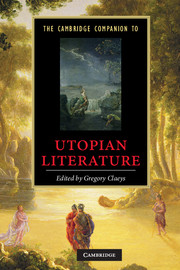10 - ‘Non-western’ utopian traditions
from Part II - Literature
Published online by Cambridge University Press: 28 September 2010
Summary
“In the red (dead) heart of Australia / Utopia is a place. / Though it bears a Western name / It is not a Western space. / But a sign that social dreaming / Can have a different face.” / Utopia and utopianism are often perceived to be primarily western constructs - western dreams of a better world, an ideal existence or a fantastic future. This is undoubtedly due to the fact that the definition, design and development of utopian literatures and theories have emerged from western examples of the genre and practice. Whether we consider the dawn of utopia as the moment when Thomas More created the neologism utopia in 1516, or seek its roots further back in Plato's Republic or St Augustine's City of God, the overwhelming majority of references to the (pre-)history of utopia point to western traditions and worldviews as its foundations. If the West is deemed to be the source of utopia, it is hardly surprising that the proliferation of definitions and theories that have contributed to critical studies of the genre are also mainly produced by and adhere to western academic models. But as western scholarship has evolved, so too have the rules determining the shape of utopia. From a literary genre, it has become a paradigm that can be applied to a wide variety of disciplines and endeavours, including architecture, music, visual arts, politics, philosophy, sociology and even psychology.
- Type
- Chapter
- Information
- The Cambridge Companion to Utopian Literature , pp. 223 - 258Publisher: Cambridge University PressPrint publication year: 2010
- 15
- Cited by



